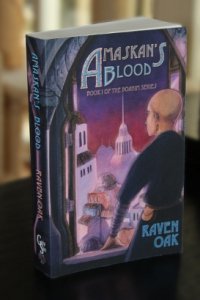
“Since your book’s technological advances place it during the Renaissance, your characters are wrong because they should be speaking like Shakespeare.”
Imagine my surprise when a friend and avid fantasy reader said this to me. I can’t remember the last time I met someone who believed that level of linguistic authenticity necessary in a fantasy world. While I love Shakespeare, if every fantasy novel I read was written with historically and culturally accurate language, I’d go mad. I don’t speak German any more than I speak Old English. Egad! Not even the people of Shakespeare’s time spoke like Shakespeare.
Imagine if The Lord of the Rings trilogy were written like this:
When Mister Bilbo Baggins of Bag Endeth announc’d that he wouldst shortly be
celebrating his eleventy-first birthday with a party of special
magnificence, thither was much talketh and excitement in Hobbiton.
Or like this:
Hwanne Dryhten Bilbo Baggins of Faetels Ende abeodan se he dulmúnus aer gebréfan beon he endleofan-fyrest ongean a gebéorscipe fram déore, þider beon fela acwepan end onwæcenness in Hobbiton.
Not so bad in Shakespeare’s tongue, but how enjoyable would the reading be in Old English?
It’s a common misconception that all fantasy is based upon medieval Europe, and everyone talks like they’re in a Shakespeare play.
One reason I call shenanigans on this misconception is that when the day is done, it’s fantasy. It’s up to the author to build a believable world however they wish. That’s not to say that linguistics doesn’t play a crucial role in world building, but as the author, you have some wiggle room in how you develop your world or universe.
 In my fantasy novel, Amaskan’s Blood, the world of Boahim consists of twelve kingdoms. Each one has their own culture that I built from a mixture of Earth cultures. But at its core, Boahim is a fantasy world that doesn’t exist on planet Earth and never did. I can set their scientific advances to be comparable to Middle Ages France, and yet, use magic to control indoor plumbing if I wish.
In my fantasy novel, Amaskan’s Blood, the world of Boahim consists of twelve kingdoms. Each one has their own culture that I built from a mixture of Earth cultures. But at its core, Boahim is a fantasy world that doesn’t exist on planet Earth and never did. I can set their scientific advances to be comparable to Middle Ages France, and yet, use magic to control indoor plumbing if I wish.
But what about linguistics? More specifically, word choice? If a kingdom is based on Renaissance France, must I write the novel in Old French? Tolkien certainly didn’t, and he was a linguistics master.
Yet Linguistics is more than word choice. It’s phonetics, morphology, syntax, semantics, pragmatics, and the order of parts of speech. (You can read more on each of these here.) These are all elements an author must consider as they write a story in a fantasy world.
Rather than dealing with absolutes, writers should consider linguistics as an essential piece of world building. You would no more have a character in Renaissance France talking about gigabytes or than you would a scullery maid speak with a refined and educated diction.
So how do we find balance with our linguistics?
- Your language must be believable. It should fit the time period and culture of the society, unless it has a strong reason not to do so.
- Don’t overdo it with newly invented words. If I need a glossary at the end of the book to translate all your made up words, I’ll be sucked out of my enjoyment to do “homework.” Harry Harrison’s West of Eden comes to mind. I made it twenty pages in before the chore of translation drove me to toss the book in the “donate” bin.
- Don’t overdo dialects. Dialects are also indications of language and cultural status, and should be used sparingly. If over used, it can fatigue the reader. (You can read more about dialect here.)
While Tolkien sprinkled bits of Sindarin, Khuzdul, and the Black Speech throughout his trilogy, he did so sparingly enough that it became flavor text””enrichment to his world building rather than a stopping block for the reader. That should be the author’s goal as well””enrichment.
While revising my fantasy novel, I kept a running list of terms that felt modern or out of place as I reread the novel. Then I used the Online Etymology Dictionary to look up the offending words. (There were over 300 of them, but it was well worth looking them up to ensure a good reading experience.)
For example, the word faux pas, French for false-step, dates back to 1670. In Boahim, one kingdom’s culture is heavily influenced by Renaissance France. It made sense in my timeline and culture for the word faux pas to exist. All that was left was double-checking whether a particular character would know and use the word. Word choice is as much a part of who your character is as the culture in which they belong.
If the time period or culture had been wrong””say from the 1800’s””it’s my job then to research why/how the word came about. I would have to make the ultimate choice on whether that word fit into the world I’ve established and the character using it.
Ultimately, it is up to the writer to build their world and decide what the characters would and would not know. Do your homework with your world building, and we’ll gladly follow the characters on their journey.
Bio: Raven Oak is the author of the bestselling fantasy novel, Amaskan’s Blood, and the upcoming sci-fi novels, Class-M Exile and The Silent Frontier. She spent most of her K-12 education doodling stories and 500 page monstrosities that are forever locked away in a filing cabinet.
She lives in Seattle, WA with her husband, and their three kitties who enjoy lounging across the keyboard when writing deadlines approach.
For more information and excerpts, visit http://www.ravenoak.net
Raven can also be found on the following sites:
Twitter: @raven_oak
Facebook: http://facebook.com/authorroak
Goodreads: https://www.goodreads.com/raven_oak
Google+: https://www.google.com/+RavenOak
YouTube: https://www.youtube.com/user/kaonevar/
Want to write your own guest post? Here’s the guidelines.
Enjoy this writing advice and want more content like it? Check out the classes Cat gives via the Rambo Academy for Wayward Writers, which offers both on-demand and live online writing classes for fantasy and science fiction writers from Cat and other authors, including Ann Leckie, Seanan McGuire, Fran Wilde and other talents! All classes include three free slots.









4 Responses
RT @Catrambo: Guest Post: @Raven_Oak on Linguistics in Fantasy””To Thee or Not to Thee http://t.co/0ZCOMT9LLT
To Thee or Not to Thee – Linguistics in #Fantasy #amwriting #writingtips http://t.co/sHH3roqDey http://t.co/HwDokGWWAr
RT @Catrambo: Guest Post: @Raven_Oak on Linguistics in Fantasy””To Thee or Not to Thee http://t.co/0ZCOMT9LLT